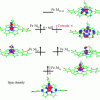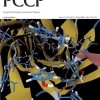Research in the TuttleLab is focused on the concept of reducing molecular search spaces. The reduction of molecular search spaces involves the use of computational methodology to inform, focus and drive the direction of molecular research. The group works in close collaboration with experimental colleagues to ensure the results from our design work are able to be directly implemented in a practical laboratory. The process of reducing molecular search spaces involves three phases: (1) rationalising and understanding existing systems; (2) isolating the governing molecular processes; and (3) predicting new systems with enhanced/desirable properties and reactivities. A variety of different methods are used in pursuit of this goal, including ab initio, DFT, semi-empirical, MM, coarse grain and hybrid QM/MM methodologies.
News From the Lab

Paper on Corroles selected as a VIP article.
The latest work from the lab on the electronic structure of iron corroles has been nominated as a “Very Important Paper” (VIP) by Chemistry – A European Journal. We’re proud of all of our projects and think they’re all worth while – but it’s nice to know that others agree sometimes as well. To read about the […]

OMx-D Method chosen as the Cover for PCCP
The recent work describing the development of the OMx-D method and its uses for describing biochemical systems has been chosen as the cover article for Physic Chemistry Chemical Physics. The semiempirical methods of the OMx family (orthogonalization models OM1, OM2, and OM3) are known to describe biochemical systems more accurately than standard semiempirical approaches such as […]








